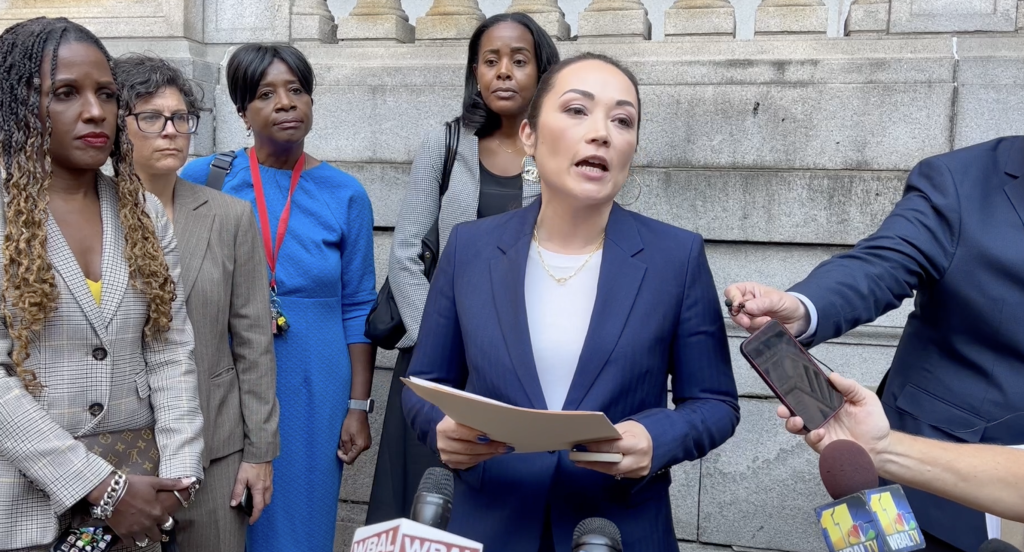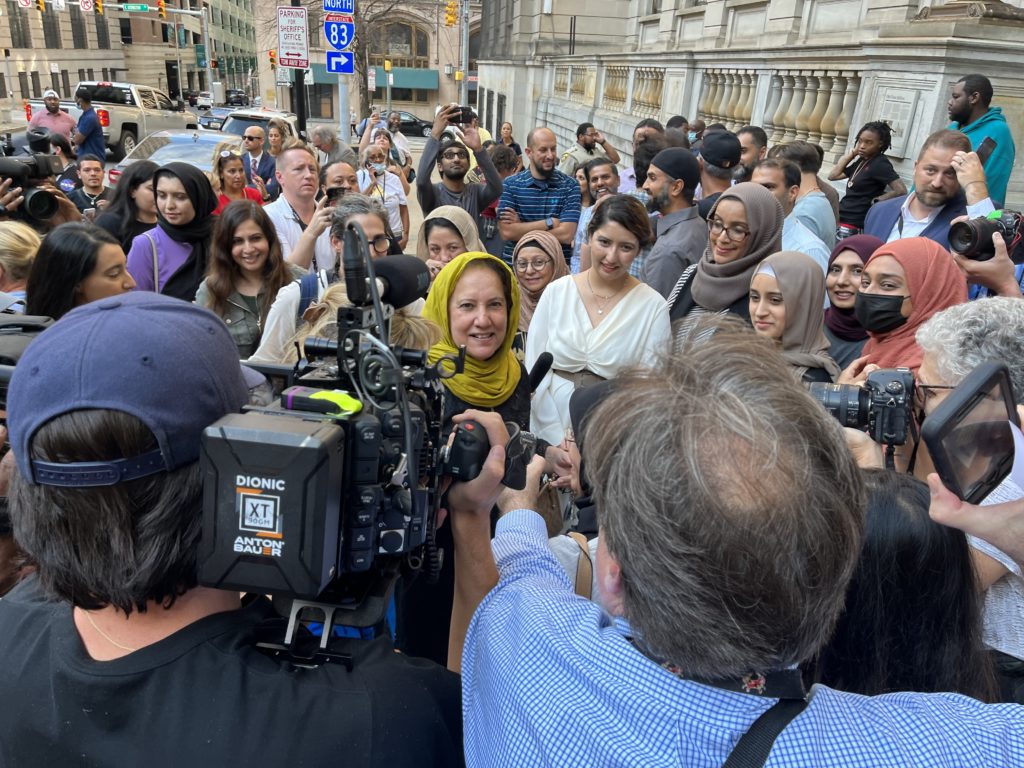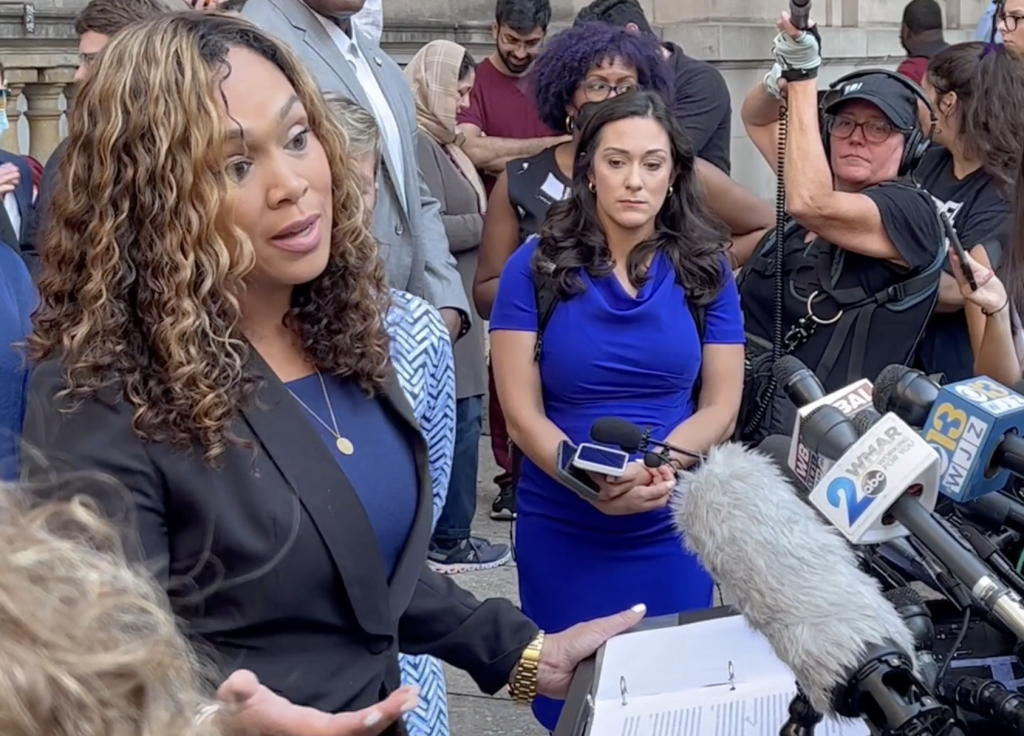On Monday afternoon, Sept. 19, cheers from Adnan Syed’s family and supporters erupted throughout the courtroom as Baltimore City Circuit Court Judge Melissa Phinn announced her decision to overturn his conviction and asked law enforcement to “remove the shackles from Mr. Syed, please.”
The crowd’s elation carried outside below the courthouse steps, where dozens of supporters applauded the news with claps and honking car horns as Syed walked through the front doors alongside his mother, brother, and attorney, Erica Suter. The cheers continued as Syed was escorted to a white SUV and drove away.
Judge Phinn granted the prosecution’s motion to overturn the 41-year-old defendant’s murder conviction in the 1999 killing of his ex-girlfriend, 18-year-old Hae Min Lee. Syed, who has served the last 23 years in prison for Lee’s murder, was released on home detention Monday pending further investigation.
Twenty-Three Years Later
Suter, Syed’s attorney and director of the University of Baltimore Innocence Project Clinic, addressed Judge Phinn’s ruling outside the Cummings Courthouse, saying that her client’s trial was “profoundly and outrageously unfair.”
“Evidence was hidden from him—evidence that pointed to other people as the killers,” Suter said. “This hidden evidence established that other people had threatened Hae’s life and hid her car in places known to them.”
Prosecutors should have provided Syed with this information “so he could defend himself,” she said.
According to Suter, 80 percent of exonerations on record in Baltimore involved withheld evidence. More than 3,000 innocent people have been exonerated nationwide, she said, while 44 percent of those cases involved evidence that the defendant was innocent but the evidence was never divulged.

Sadly, this isn’t unusual.
During Monday’s proceedings the prosecution brought into question the past misconduct of one of the two detectives who were crucial in the investigation of Lee’s death. Although his misconduct wasn’t specifically linked to Syed’s case, the detective was involved in another murder case that ended with the defendant’s exoneration.
The National Registry of Exonerations reports that Malcolm Bryant was accused of a fatal stabbing in 1998 in Baltimore City and was convicted the following year. Behind his conviction was a witness who identified Bryant as the suspect, insufficient and lack of DNA testing, and this detective.
Bryant was exonerated in 2016 after further DNA testing.
Baltimore City has exonerated 32 people with convictions dating back to 1968, with 26 out of 32 exonerations involving homicide, the registry reports. Nineteen of those exonerated homicide defendants received a life sentence at the time of their conviction.
Defendants ranged in age from 16 to 62.
No exonerations have been reported on the registry in 2022, including Syed; however, two were reported last year. These accused men were both sentenced to 50 years for separate crimes and were convicted in 1991 and 2005, respectively.
Both involved official misconduct.
Integrity of Case Compromised
Adnan Syed was not exonerated on Monday, but he was released as the investigation remains ongoing.
In February 2000, Syed was just 17 years old when he was found guilty of Lee’s murder. His case was publically ignored until 2014 with the release of Sarah Koenig’s popular “Serial” podcast, which meticulously broke down details of the case, including the Baltimore Police Department’s (BPD) investigation and the legal actions that proceeded.
Syed’s conviction resulted in a sentence of life in prison plus 30 years. The Court of Special Appeals affirmed Syed’s conviction in 2003, yet, the case has continued with post-conviction proceedings through 2019.
During the proceedings, Judge Phinn heard from the prosecution and Suter in connection to the Baltimore City State’s Attorney’s Office’s motion to overturn Syed’s conviction that was filed on Sept. 14. Spectators and media joined members of the Syed family inside one of the larger courtrooms on the fifth floor of the Cummings Courthouse, where the judge took to the bench shortly after 2 p.m.
The clinking of Syed’s chains filled the gallery before the defendant set foot in the courtroom. Wearing a white buttoned down shirt, dark dress pants and a knitted white kufi with thin striped lines, Syed took a seat next to his defense attorney.
Baltimore State’s Attorney Marilyn Mosby previously announced that Syed “deserves a new trial,” citing new evidence that was discovered during a nearly yearlong investigation in 2021.
The prosecutor called into question the integrity of Syed’s conviction during the hearing when she said that a new trial or dismissal of the charges would be contingent on the investigation but that the prosecution would request Syed be released on his own recognizance.
The prosecutor said Suter was involved in the investigation that identified two alternative suspects who weren’t disclosed to defense counsel during Syed’s initial trial as well as other new evidence.
The prosecutor informed the court that two suspects were identified in the original investigation and “not properly ruled out.” While reviewing the 17 boxes containing Syed’s trial and post-conviction files, she said, documents revealed one of the suspects was upset with Lee and allegedly threatened her, saying, “he would make [Lee] disappear. He would kill her.”
One of the suspects was also improperly cleared from the investigation after the incorrect use of a polygraph test, the prosecution noted. She explained that one of the suspect’s polygraph tests indicated deception; however, the police allowed the suspect to leave and return to take another test after the suspect claimed to be anxious.
Neither of the two suspects were identified by the prosecution, but the prosecutor argued that the suspect had “motive, opportunity, and means to commit this crime.”
The location of Lee’s car was another topic broached during the hearing as Lee’s car was found on the 300 block of Edgewood Avenue behind one of the newly-identified suspect’s family member’s home — information that was not included in Syed’s trial.
Additionally, the prosecution explained that one of the suspects was involved in several separate violent incidents, including the attack of a woman inside her vehicle, a serial rape and sexual assault, and an act of violence against another woman.
Some of the evidence from Syed’s trial was now unreliable, the prosecutor added. For example, the initial investigation that identified Syed as the suspect, which co-defendant Jay Wilds had confirmed with police. Wilds said he helped Syed bury Lee’s body in Leakin Park and told police where they could find Lee’s car on Edgewood Avenue.
Lee’s body was found in a shallow grave about a month after her disappearance on Jan. 13, 1999.
During an interview with police on Feb. 28, 1999, Wilds said Syed showed him Lee’s body on Edmondson Avenue. Less than a month later, he said he was shown the body in the Best Buy parking lot on Security Boulevard in Windsor Mill, Md. The co-defendant informed police of a third location he saw the body—at his grandmother’s house—in another interview in 2014.
This was “the most concerning discrepancy,” the prosecutor told the judge, describing the unreliability of Wilds’ testimony.
The co-defendant’s testimony was, once again, picked apart after evidence revealed that another classmate’s recollection of Jan. 13 was used to support his testimony.
Cell phone evidence was yet another contributing factor to the prosecution’s case in Syed’s trial—evidence the prosecutor informed the court now “weakened” the case.
The initial investigation involved determining Syed’s location on the day of Lee’s disappearance using his cell phone, she said. It wasn’t until a post-conviction hearing in 2016 when this information was deemed unreliable as incoming calls were insufficient in determining the defendant’s location.
The prosecutor reiterated that the State’s Attorney’s Office was not declaring Syed innocent, but that the office “lacks confidence” in his initial conviction.

Soon to graduate from Woodlawn High School, Suter said in a press conference, Syed was robbed of attending his high school graduation and plans to study pre-med at the University of Maryland, Baltimore County.
Syed is “a thoughtful, devout, passionate man,” Suter said, “who is grateful that he can start rebuilding his free life.”
Syed did not make a statement but told Suter that “he can’t believe it’s real.”
Among Syed’s supporters was Willie Hamilton who was at the courthouse on Monday just three months after he was released from a 30-year sentence to attend his friend and former cellmate’s hearing. Hamilton met Syed at the Maryland House of Correction-Annex, now the Jessup Correctional Institution, in 2000.
The 47-year-old man said he learned about the hearing during a phone call with Syed four days prior and recalled spending many nights talking with Syed about his case.
“He wouldn’t talk about, ‘I didn’t do this,’” Hamilton noted. “His only concern was that he wanted to be there for his parents.”
“He’s one of the best human beings I’ve ever met in my life. This is not an understatement,” he said. “He’s a good individual. He was there for me as much as I was there for him.”
Injustice for the Lee Family
Earlier in the proceedings, the victim’s brother left work to join the hearing via Zoom after attorney Steve Kelly, who represented the Lee family, argued that the court provided an insufficient period of time for the family to attend.
Through muffled sobs, Lee’s brother mentioned how his heart was pounding as he said he believed the judge who presided over Syed’s trial “made the right decision” with his conviction.
“Going through this again is living a nightmare over and over again,” he said, adding that he felt betrayed by the State’s Attorney’s Office’s motion. “I am not against investigation, but the motion to vacate judgment is just hard to swallow.”
“This is not a podcast. This is real life,” he said through tears before asking Judge Phinn to “make the right decision.”
An Ongoing Investigation & Further Action
Mosby addressed a scrum of news reporters after the hearing, saying that she could not talk about the substance of the case, but that the prosecutor’s office is working with the BPD in the active investigation. The office is currently waiting for DNA analysis results from Lee’s clothing, shoes and rape kit that will determine whether Syed’s case will be dismissed or move forward with a new trial.
DNA testing was previously conducted but returned with mostly inconclusive DNA results or no DNA results.
“We feel, again, that all of these facts go to the integrity of the conviction, which is problematic,” Mosby said. “Once DNA evidence comes in, it will be much more definitive.”

The prosecution has 30 days to either dismiss the charges or refile for trial. Should the DNA test be unavailable within that time, Mosby said the prosecution will “leap that hurdle when it comes.”
“The mantra, mission and vision of my office is very different than what it has been in the past,” she said. “Our mission and vision is justice over convictions. For a very long time, people would measure the success of a prosecutor’s office based off of convictions. We don’t do that in city courts. We go on the basis of justice.”


